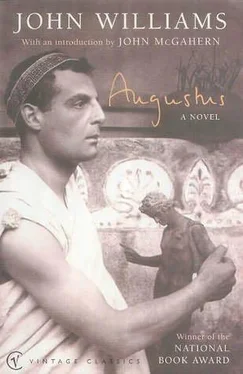John Williams - Augustus
Здесь есть возможность читать онлайн «John Williams - Augustus» весь текст электронной книги совершенно бесплатно (целиком полную версию без сокращений). В некоторых случаях можно слушать аудио, скачать через торрент в формате fb2 и присутствует краткое содержание. Жанр: Историческая проза, на английском языке. Описание произведения, (предисловие) а так же отзывы посетителей доступны на портале библиотеки ЛибКат.
- Название:Augustus
- Автор:
- Жанр:
- Год:неизвестен
- ISBN:нет данных
- Рейтинг книги:3 / 5. Голосов: 1
-
Избранное:Добавить в избранное
- Отзывы:
-
Ваша оценка:
- 60
- 1
- 2
- 3
- 4
- 5
Augustus: краткое содержание, описание и аннотация
Предлагаем к чтению аннотацию, описание, краткое содержание или предисловие (зависит от того, что написал сам автор книги «Augustus»). Если вы не нашли необходимую информацию о книге — напишите в комментариях, мы постараемся отыскать её.
Augustus — читать онлайн бесплатно полную книгу (весь текст) целиком
Ниже представлен текст книги, разбитый по страницам. Система сохранения места последней прочитанной страницы, позволяет с удобством читать онлайн бесплатно книгу «Augustus», без необходимости каждый раз заново искать на чём Вы остановились. Поставьте закладку, и сможете в любой момент перейти на страницу, на которой закончили чтение.
Интервал:
Закладка:
"Of an honored Roman name, you had in full degree those old virtues of the earth which have nurtured and sustained our nation throughout its history. You spun and wove the cloth that furnished your household its clothing; your servants were as your own children; you honored the gods of your house and of your city. Through your gentleness you had no enemy but time, who takes you now.
"Oh Rome, look upon the one who lies here now, and see the best of your nature and your heritage. Soon we shall take these remains beyond the city walls, and there the funeral pyre will consume the receptacle of all that Atia was. But I charge you, citizens, do not let her virtues be entombed with her ashes. Rather let that virtue become your Roman lives, so that, though Atia's person be but ash, yet the better part of her will live on, entombed in the living souls of all Romans who come after her.
"Atia, may the spirits of the dead keep your rest."
A long silence stayed upon the crowd. Octavius stood for a moment on the rostrum. Then he descended, and they bore the body outside the Forum, and beyond the city walls.
I cannot bring myself to believe what I have seen, or to give credence to what I have heard. In this chaos, there is no official news; nothing is posted on the walls of the Senate House; one cannot even be sure that there is a Senate any more. Octavius Caesar has joined with Antonius and Lepidus in what amounts to a military dictatorship; and the enemies of Julius Caesar are proscribed. More than a hundred senators-senators-have been executed, their property and wealth confiscated; and many times that number of wealthy Roman citizens, often of noble name, are either murdered or fled from the city, their property and wealth in the hands of the triumvirs. Merciless. Among those proscribed: Paullus, the blood brother of Lepidus. Lucius Caesar, the uncle of Antonius. And even the famous Cicero is on the published list. These three, and others, I imagine, have fled the city, and may escape with their lives.
The bloodiest of the work seems to be in the hands of Antonius's soldiers. With my own eyes I have seen the headless bodies of Roman senators littering the very Forum which a week ago was their chief glory; and I have heard, from the safety of my hill, the screams of the rich who have waited too long to flee Rome and their riches. All except the poor, those with moderate wealth, and the friends of Caesar, walk in apprehension of what the morrow might bring, whether their names have been posted or not.
It is said that Octavius Caesar sits in his home and will not show his face nor view the dead bodies of his former colleagues. It is also said that it is Octavius himself who insists that the proscriptions be carried out ruthlessly, at once, and to the letter. One does not know what one may with safety believe.
Is this the Rome that I thought I was beginning to know, after these crowded months? Have I understood these people at all? Athenodorus will not discuss the matter with me; Tyrannion shakes his head sadly.
Perhaps I am less the man and more the youth than I had believed.
Cicero did not escape.
Yesterday, on a cool, bright December afternoon, wandering among the bookstalls in the shop area behind the Forum (it is safe to be on the streets now), I heard a great commotion; and against my better judgment, out ofthat curiosity that will someday lead me either to fame or death, I made my way inside the Forum gates. A great crush of people was milling around the rostrum near the Senate House.
"It's Cicero," someone said, and the name went like a whispering sigh among the people. "Cicero…"
Not knowing what to expect, but dreading what I would see, I pushed my way through the crowd.
There on the Senate rostrum, placed neatly between two severed hands, was the withered and shrunken head of Marcus Tullius Cicero. Someone said that it had been placed there by order of Antonius himself.
It was the same rostrum from which, only three weeks before, Octavius Caesar had spoken so gently of his mother, who had died. Now another death sat upon it; and I could not help, at that moment, being somehow pleased that the mother had died before she had been made witness to what her son had wrought.
II. Letter: Marcus Junius Brutus to Octavius Caesar, from Smyrna (42 B. c.)
I cannot believe that you truly apprehend the gravity of your position. I know that you bear me no love, and I would be foolish if I pretended that I bore you much more; I do not write you out of regard for your person, but out of regard for our nation. I cannot write to Antonius, for he is a madman; I cannot write to Lepidus, for he is a fool. I hope that I may be heard by you, who are neither.
I know that it is through your influence that Cassius and I have been declared outlaws and condemned to exile; but let neither of us believe that such a condemnation has more permanent force of law than can be sustained by a flustered and demoralized Senate. Let neither of us pretend that such an edict has any kind of permanence or validity. Let us speak practically.
All of Syria, all of Macedonia, all of Epirus, all of Greece, all of Asia are ours. All of the East is against you, and the power and wealth of the East is not inconsiderable. We control absolutely the eastern Mediterranean; therefore you can expect no aid from your late uncle's Egyptian mistress, who might otherwise furnish wealth and manpower to your cause. And though I bear him no love, I know that the pirate, Sextus Pompeius, is nipping at your heels from the west. Thus I do not fear for myself or my forces the war that now seems imminent.
But I do fear for Rome, and for the future of the state. The proscriptions that you and your friends have instituted in Rome bear witness to that fear, to which my personal grief must be subordinate.
So let us forget proscriptions and assassinations; if you can forgive me the death of Caesar, perhaps I can forgive you the death of Cicero. We cannot be friends to each other; neither of us needs that. But perhaps we can be friends to Rome.
I implore you, do not march with Marcus Antonius. Another battle between Romans would, I fear, destroy what little virtue remains in our state. And Antonius will not march without you.
If you do not march, I assure you that you will have my respect and my thanks; and your future will be assured. If we cannot work together out of friendship to each other, yet we may work together for the good of Rome.
But let me hasten to add this. If you reject this offer of amity, I shall resist with all my strength; and you will be destroyed. I say this with sadness; but I say it.
III. The Memoirs of Marcus Agrippa: Fragments (13 B. c.)
And after the triumvirate was formed and the Roman enemies of Julius Caesar and Caesar Augustus were put down, there yet remained in the West the forces of the pirate Sextus Pompeius, and in the East the exiled murderers of the divine Julius, that Brutus and Cassius who threatened the safety and order of Rome. True to his oath, Caesar Augustus resolved to punish the murderers of his father and restore order to the state, and deferred the matter of Sextus Pompeius to another time, taking only those actions against Pompeius that were necessary for the safety of the moment.
My energies at this time were devoted to enrolling and equipping in Italy those legions that were to lay siege to Brutus and Cassius in the East, and to organizing the lines of supply that would allow us to do battle on that distant soil. Antonius was to send eight legions to Amphipolis, on the Aegean coast of Macedonia, to harass the troops of Brutus and Cassius, so that they might not find an advantage of terrain in which to fight. But Antonius delayed the departure of his legions, so that they were forced to find an inferior position on the low ground west of Philippi, where the army of Brutus rested in security. It became necessary for Antonius to send other legions in support of those in Macedonia, but the fleets of Brutus and Cassius hovered around the harbor at Brindisi; so Augustus commanded me to insure safe passage for Antonius. And with the ships and legions that I had raised in Italy, we drove through the navy of Marcus Junius Brutus and landed twelve legions of troops upon the Macedonian shore at Dyrrachium.
Читать дальшеИнтервал:
Закладка:
Похожие книги на «Augustus»
Представляем Вашему вниманию похожие книги на «Augustus» списком для выбора. Мы отобрали схожую по названию и смыслу литературу в надежде предоставить читателям больше вариантов отыскать новые, интересные, ещё непрочитанные произведения.
Обсуждение, отзывы о книге «Augustus» и просто собственные мнения читателей. Оставьте ваши комментарии, напишите, что Вы думаете о произведении, его смысле или главных героях. Укажите что конкретно понравилось, а что нет, и почему Вы так считаете.











